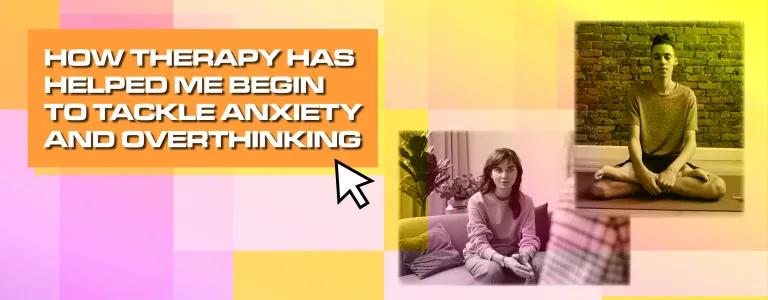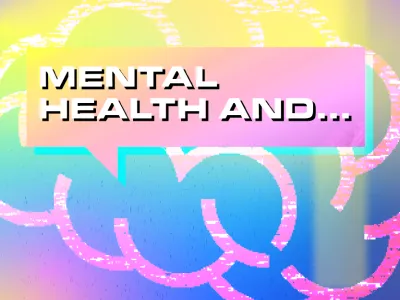
How Therapy Has Helped Me Begin To Tackle Anxiety And Overthinking
Writers’ Club member Yasmin discusses the benefits of therapy…
Mental health and well-being is one of the biggest factors of a person's quality of life. It is being increasingly discussed throughout society, especially by younger generations who are taking more action and accountability over their wellbeing and going to therapy. There are many free NHS mental health and therapy services to utilise, as well as multiple private practices around the UK. To register for NHS therapy you can visit the UK Gov website and refer yourself through their online service, or you can book an appointment with your GP and they can refer you accordingly. To register for NHS therapy you must be registered at a UK GP practice.
Over the last few years I have been trialling different styles of therapy and different therapists to find the ones best-suited for me. Although there were a few bumps in the road, I’ve definitely gained a lot from all my experiences with therapy, and I would like to share some of the most important things I’ve learnt throughout my path to become the person I am, and who I continue to become. Please keep in mind that I am not a therapist or have any professional background to give advice from, this is purely from my own experience and how I have chosen to approach myself through therapy.
I struggle daily with anxiety and overthinking; I have always felt very trapped and stuck inside my mind, and I still do. However, I have begun to gain better skills in self-observation, which led me to be able to understand more about why I feel trapped, and start working through those mental blocks to further free myself from my limiting beliefs. One of the most effective ways I have managed to learn this is through the process of therapy itself. Hearing what my therapist has to say after I explain how I feel, and remembering that during troubling times, really helps me to hear a logical voice in my mind which isn’t connected to my life through a personal relationship. To have someone who can healthily guide me to challenge my own inner dialogue and beliefs in a safe space has increased my ability to do it myself when I notice myself getting sucked into my thoughts.
You don’t need to be mentally ill or have any severe mental issues to go to therapy. It is a brilliant method of gaining more emotional intelligence, depth, understanding of the self, and gives you skills to better cope with life’s trials and tribulations when faced with them. I like thinking about therapy as a method of self-care, because it has greatly changed and impacted my life in multiple ways, and continues to do so profoundly.
I started journaling to do this, as it acts as an extension of my therapy sessions into something more tangible and creative, especially as a visual and artistic person. I treat my journal as a space of neutrality, honesty and truth, compassion, introspection, understanding, growth, and a place to dismantle my thoughts. It is somewhere I can write down everything that comes to mind without judgement. I can draw out my thoughts and feelings, study them with compassion, and pick out things that sound subjective and anchored to my own perspective in order to delve deeper and challenge those inner perceptions. Through journaling, I’ve given myself skills to guide similar trails of thought inside my mind without writing them down; this is helpful if I find myself overwhelmed in a situation where I cannot sit down to journal. I do this through meditation, which is another practice that has helped me significantly on multiple occasions, and continues to improve my wellbeing especially in the way in which I utilise it.

I give myself some time to breathe deeply into my body, and remind myself that the body and mind are always able to balance each other to a great degree when either one is out of alignment. When my mind is off course, I can use my physical body to gain back some of that stability and calmness. And when my body experiences physical symptoms of anxiety and instability, I can use my mind to step back and prevent myself from defining those experiences as truths about who I am in that moment, or feeling completely lost and overwhelmed by my feelings. It has taken a long time for me to be able to observe myself and attach myself less to my thoughts and feelings. I believe that starting small helps build that consistency and confidence to do so when trying to tackle larger-scale things.
A significant thing that has allowed me to do this is simply allowing myself to feel and think whatever I do without labelling it as good or bad, or right or wrong. Everything we feel and think is a reflection of our perspective of our lives. This can be used as a powerful telescope into past experiences and emotions which are unhealed, which cause us to react in the ways we do in the present moment. Understanding this and looking at yourself with a lens of neutrality is so important, because you begin creating that same non-judgemental space within yourself in order to feel safer in your own body. You can allow yourself to experience every emotion and thought without categorising or compartmentalising it as a way to make sense of it straight away. Everything you experience can be seen as a message; your mind and body are simply reacting. The ways in which you interpret those reactions determines how much you’re able to understand and learn about yourself and what you are experiencing.

If you find yourself overwhelmed but cannot word the emotions you feel or why you are feeling them, you can begin by validating the physical experiences you’re having. Such as, ‘I feel a tightness in my stomach. My breath is shallow. My heart is pounding’. Then, you can create your own counter-affirmations to help soothe yourself according to the physical symptoms you’re experiencing. Such as, ‘I am safe. I can experience symptoms of anxiety and still be safe and loved. I am experiencing difficult physical symptoms and that is okay. I am still me, worthy, and valuable, even whilst experiencing anxiety. I allow myself to experience the present moment with no judgement. It is okay to allow my body to express itself in this manner. These symptoms are temporary, and I will soon find calmness once again’.
Doing this whenever you notice yourself having a reaction, minuscule or not, helps guide your way of thinking into one of compassion, instead of judging yourself and criticising yourself. Once you have practiced this method of just allowing yourself to ‘be’ and ‘experience’ without judgement, you can begin to ask yourself questions to deepen your understanding of why you experienced something difficult or uncomfortable within yourself. You can use these questions as journal prompts or things you can think about. Some questions can be, ‘What about -said situation- made me the most uncomfortable? Have I experienced this emotion/reaction before? If so, when was it? What happened? Did I feel that my emotions were validated and understood? Am I reacting to this past situation in my present moment? Am I giving the present moment a narrative/story from my past in order to express what I wish I had said/done? Am I reacting appropriately to the reality of the present moment or am I reacting out of fear of past pain and hurt? What can I do right now to validate my feelings and express myself in a healthy and safe way?’
There are many more questions like these you could ask depending on your individual situation, these are just a few which have helped me immensely when I’m trying to understand my own reactions and triggers to things. The real difficulty of these questions is being completely truthful and honest in every single answer. Sometimes it takes multiple times asking yourself these questions to get to the root of what has caused you to react, and more often than not there is always more than one cause/trauma which has built up to form these reactions. There is nothing wrong with experiencing triggers and responses to things, but it is our own responsibility to take accountability for our self-improvement and develop better coping skills in order to give ourselves a better quality of life, and in turn, give others the opportunity to have a better and healthier relationship with us.

I hope that this has given you some insight and ideas about how to begin tackling the more uncomfortable aspects of yourselves on a daily basis. Thank you for reading!




